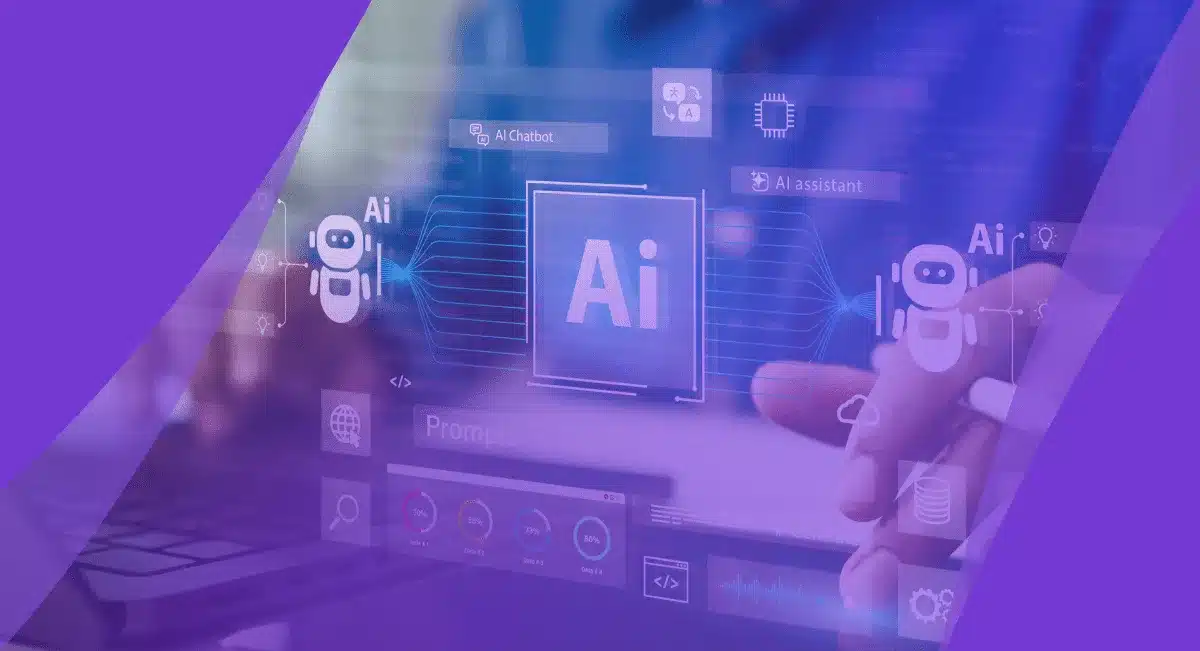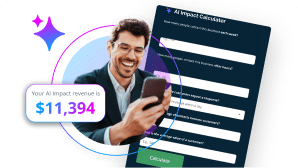The way we work is evolving fast. AI agents aren’t just supporting tasks—they’re executing them. From admin to full campaigns, these digital coworkers are transforming how businesses operate. For SMBs juggling multiple tools, channels, and customer touchpoints, AI agent platforms provide a smarter path to efficiency, automation, and scalable growth, handling everything from support and outreach to lead qualification and operational tasks. And adoption is accelerating: 73% of business leaders have already launched intelligent automation initiatives that combine AI and machine learning, highlighting just how quickly this technology is becoming foundational, not optional. In 2025, the question isn’t if AI should be part of your strategy—it’s which platform will drive your next phase of growth. This guide highlights the 10 top AI agent platforms tailored to SMB-focused partners, with key insights, features, and use cases to help you choose the right fit.
Automate every step of the customer journey with AI employees
What is an AI Agent Platform?
An AI agent platform allows businesses to deploy intelligent, automated virtual agents that can take action, make decisions, and continuously optimize tasks using artificial intelligence. These agents go far beyond simple chat interactions—they can analyze data, understand context, manage complex workflows, and even trigger actions across connected systems. AI agents or AI workforce can be customized for different functions across a business, including:
- Sales assistants who qualify leads, follow up with prospects, and schedule appointments.
- Customer service agents who resolve inquiries, escalate issues when needed, and learn from every interaction.
- Marketing optimizers who personalize campaigns, suggest content, and adapt outreach strategies based on engagement.
- Workflow coordinators who monitor business processes, identify bottlenecks, and automate repetitive tasks.
By intelligently bridging multiple systems and touchpoints, AI agents help businesses operate more efficiently, deliver better customer experiences, and scale without increasing overhead.
How AI Agents Differ from Chatbots or Traditional Automation
Many businesses already use some form of automation—so what makes AI agents different?
| Feature | Traditional Automation | Chatbots | AI Agents |
| Primary Function | Executes predefined, rule-based tasks | Responds to customer queries in a conversational format | Takes action, makes decisions, and drives outcomes |
| Responsiveness | Reactive only | Reactive—requires user input | Proactive—initiates tasks and interactions |
| Flexibility | Limited to programmed scenarios | Some flexibility via NLP | Learns and adapts from new data and interactions |
| Context Awareness | Minimal | Limited—often doesn’t reference history or systems | Uses contextual data from across business systems |
| Learning & Improvement | Static—does not improve over time | Basic—may use simple learning models | Continuously optimizes based on feedback and results |
| Decision-Making Capability | None | Very limited—mostly follows scripts | Autonomous within parameters; makes smart, goal-driven decisions |
| Outcome Orientation | Task completion | Conversation handling | Business impact—focused on measurable outcomes |
In short: Where automation follows rules and chatbots hold conversations, AI agents drive outcomes.
Why AI Agent Platforms Matter More Than Ever
AI agent platforms are designed to handle the repetitive, time-consuming tasks that drain your team’s time, such as lead follow-ups, campaign execution, reporting, and customer messaging. By automating these processes, AI agents eliminate the need to constantly juggle multiple disconnected tools and manual workflows. The result is a more streamlined, integrated approach that frees your team to focus on higher-impact work like strategy, creativity, and business development. Key benefits include:
- Significant time savings
- Lower operational overhead
- Improved consistency across every customer touchpoint
Make Smarter, Faster Business Decisions
Where traditional automation simply follows static rules, AI agents take it a step further. They analyze data in real time, learn from every interaction, and proactively optimize campaigns, spot opportunities, and address issues—often before a human even notices. AI agents don’t just react to input; they take initiative. By continuously monitoring performance, customer behavior, and market trends, these platforms empower businesses to make faster, smarter, data-driven decisions that would otherwise require hours of manual analysis. The result: A more agile, responsive business that can capitalize on opportunities and adapt to change with speed and confidence.
Deliver Scalable, Personalized Engagement
In today’s marketplace, customers expect personalized experiences, and AI agents make it possible to deliver them at scale. Whether managing thousands of individual customers or dozens of client accounts, AI agents can tailor interactions based on user preferences, behaviors, and real-time context. Each interaction can feel personalized and relevant, even though it’s automated—building deeper connections and stronger brand loyalty. And because AI agents can operate 24/7 without fatigue, they allow businesses to maintain a consistently high level of service and engagement without requiring additional staff.
Top Features to Look for in the Best AI Agent Platform
With so many AI agent platforms emerging, not all are created equal. To ensure you choose a solution that delivers real value—whether for your business or your clients—you need to focus on the features that truly move the needle. Here are the essential capabilities that define the best AI agent platforms today.
Proactive Intelligence
Gone are the days when automation simply reacted to user inputs. The best AI agents anticipate needs and take initiative, learning from data, trends, and behavior. Leading platforms will:
- Recommend optimizations or next best actions based on performance
- Adjust strategies automatically as customer behavior or market conditions change
- Trigger workflows in real time from live insights, not static rules
This transforms AI from a passive assistant into an active driver of growth and efficiency.
Workflow Automation
An AI agent should manage entire processes, not just isolated tasks. This means coordinating multiple steps across systems—saving time, reducing errors, and delivering a seamless experience. Key examples of automated workflows:
- Marketing campaigns → launch → optimize → follow up
- Appointment management → booking → confirmation → post-visit feedback
- Lead management → intake → qualification → CRM update → nurture sequence
Platforms with robust workflow automation enable your team to scale output without scaling headcount.
Contextual Awareness
A great AI agent doesn’t just execute tasks—it understands the context behind them. Look for platforms that can:
- Reference CRM data and customer history
- Adapt based on engagement across channels
- Understand timing and the customer’s journey stage
This contextual intelligence powers hyper-personalized interactions, increasing customer satisfaction and conversion rates.
Integration Capabilities
AI agents work best when they’re deeply connected to your tech stack. Seamless integration enables richer data, better insights, and more powerful automation. Prioritize platforms that offer:
- Native integrations with popular CRMs, email marketing platforms, and ecommerce tools
- Robust APIs to connect with niche or proprietary systems
- Real-time data sync for accurate, up-to-the-minute decision making
Scalability and Multi-Tenant Support
For agencies, franchisors, and platform providers, scalability is non-negotiable. Choose a platform that supports:
- Multiple clients or locations from a single interface
- User-level roles and permissions for security and clarity
- Shared dashboards to simplify oversight and reporting
This ensures you can manage complex, high-volume operations efficiently.
White-Labeling Options
If you’re a reseller, agency, or SaaS partner, white-labeling is a key differentiator. Look for:
- Full custom branding (logos, colors, domain)
- Client-facing portals that match your brand identity
- Private-labeled AI agents (sometimes called “virtual employees”) that reflect your tone and voice
This helps you create new revenue streams and strengthen brand loyalty.
Real-Time Data Inference
In 2025, businesses can’t afford lagging insights. The best AI agents:
- Analyze campaign results, user behavior, and transactions in real time
- Adapt and optimize actions dynamically to drive better outcomes
- Continuously learn and improve over time
This leads to smarter, more effective automation that keeps pace with a fast-changing market.
No-Code or Low-Code Setup
Your AI agent platform should be accessible to non-technical users. Top solutions provide:
- Drag-and-drop workflow builders
- Natural language interfaces for setup and customization
- Prebuilt templates for common use cases (marketing, sales, customer service)
This reduces IT dependency and accelerates time-to-value.
Multi-Channel Engagement
Customers expect to engage on their terms. Your AI agent should work seamlessly across:
- SMS
- Web chat
- Social platforms (like Facebook Messenger, WhatsApp, Instagram)
A true multi-channel approach ensures a consistent brand experience, boosting engagement and loyalty.
Transparent Reporting and Control
AI-driven automation should never be a “black box.” Business owners need visibility into what the AI is doing. Look for platforms with:
- Detailed task history for auditing actions
- Clear performance metrics to gauge success
- Human override options to fine-tune or adjust AI behavior
Transparency builds trust and allows ongoing optimization of both the platform and your strategies.
Example Comparison Chart
Here’s a sample chart to help visualize how popular AI agent platforms stack up on these features:
| Vendasta AI Agents | ChatGPT w/ GPTs | HubSpot AI | Drift AI | Tidio AI | |
| Proactive Intelligence | ✅ | ✅ | ✅ | ✅ | ✅ |
| Workflow Automation | ✅ | Partial | ✅ | ✅ | ✅ |
| Contextual Awareness | ✅ | ✅ | ✅ | ✅ | ✅ |
| Integration Capabilities | Deep w/ platform | API needed | Native | Native | Native |
| Scalability & Multi-Tenant | ✅ | Limited | Some tiers | ✅ | Partial |
| White-Labeling Options | ✅ | ❌ | ❌ | ❌ | Partial |
| Real-Time Data Inference | ✅ | ✅ | ✅ | ✅ | Partial |
| No-Code / Low-Code Setup | ✅ | Partial | ✅ | ✅ | ✅ |
| Multi-Channel Engagement | ✅ | Partial | ✅ | ✅ | ✅ |
| Transparent Reporting & Control | ✅ | Partial | ✅ | ✅ | ✅ |
10 Best AI Agent Platforms in 2025
1. Vendasta – Best AI Agent Platform for End-to-End SMB Growth
Vendasta’s AI agent platform takes a unique approach: rather than simply offering “AI assistants” or “virtual agents,” Vendasta calls them AI Employees—digital team members that proactively drive business outcomes on behalf of your organization and your SMB clients. Designed specifically for agencies, franchisors, MSPs, and SaaS partners supporting the SMB market, Vendasta’s AI Employees are deeply integrated into the entire business operating platform. They don’t just automate isolated tasks—they work across marketing, sales, customer service, and reporting to drive measurable growth at scale.
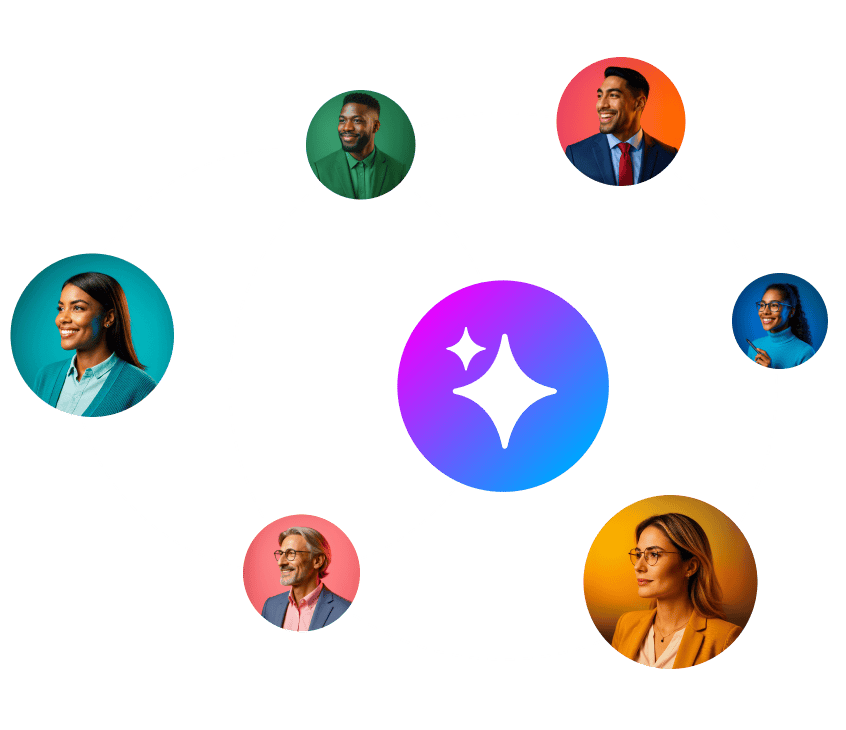
Key Capabilities
- Act autonomously on your team’s behalf: AI Employees go beyond simple automation—executing campaigns, publishing social posts, following up with leads, managing appointments, requesting reviews, and more, without constant oversight.
- Proactively suggest, optimize, and execute: These AI agents don’t sit idle waiting for instructions. They actively identify opportunities to improve performance, suggest next steps, and execute tasks that move the business forward in real time.
- Deliver hyper-personalized experiences: Using real SMB data from your CRM, marketing performance, engagement trends, and past interactions, AI Employees tailor every message and task for maximum impact.
Why It Stands Out
- Embedded intelligence across the full platform: Unlike siloed AI tools, Vendasta’s AI Employees are embedded across the entire platform, including CRM, marketing automation, ecommerce, reputation management, and reporting. This gives them full visibility into customer data and workflows, enabling smarter and more personalized actions across the customer journey.
- Built for Partner–SMB collaboration: With shared client dashboards, real-time task visibility, and transparent reporting, partners and clients stay aligned, building trust in the AI’s performance and decisions.
- White-label ready for your brand: Fully brandable as part of your own service offering, these AI Employees let you deliver cutting-edge automation under your own name—no development required.
Ideal For
- Agencies scaling client services without adding headcount
- Franchisors and multi-location brands standardizing local marketing execution
- MSPs and technology providers delivering AI-driven automation and business growth solutions for SMB customers
- SMBs looking to scale operations and customer engagement through AI automation
2. ChatGPT (OpenAI) – Best for General AI Tasks
ChatGPT by OpenAI is one of the most popular and flexible AI tools on the market. Originally known for conversational AI, it has quickly evolved into a versatile agent capable of supporting a wide range of business functions—from content creation to customer service to workflow automation. With Custom GPTs and robust API integrations, businesses can adapt ChatGPT for specialized use cases across industries and teams.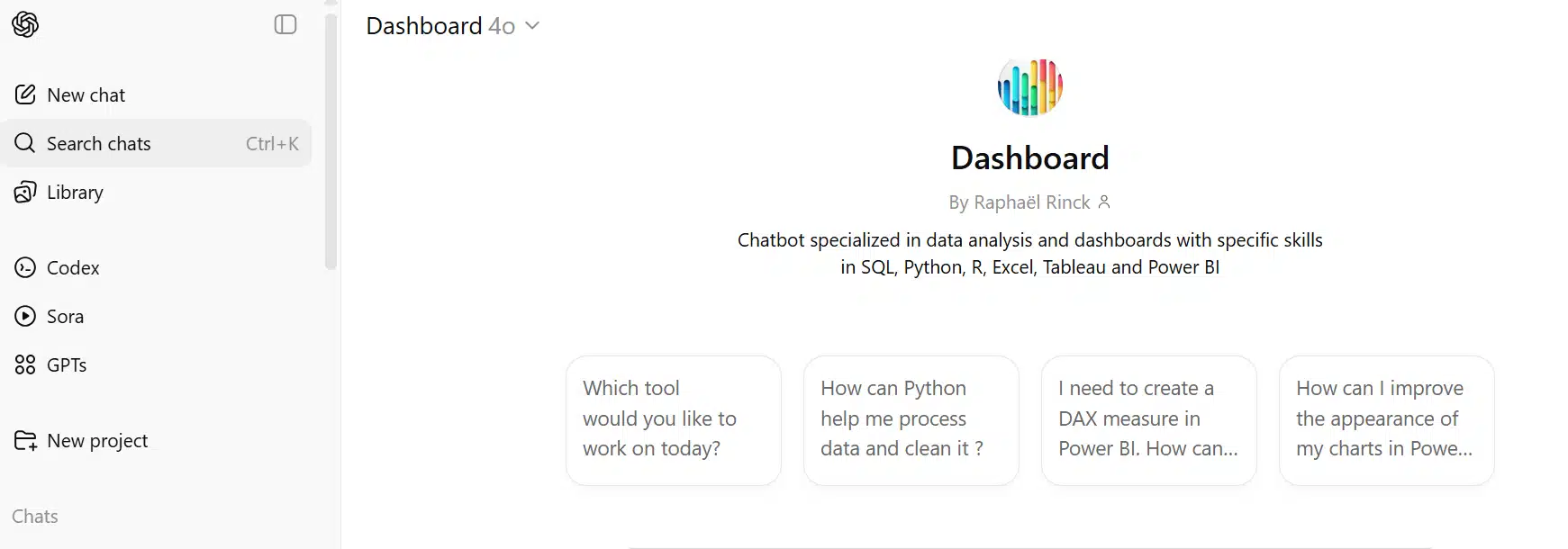
Key Capabilities
- Conversational AI: Responds to customer inquiries via chat, email, and messaging channels
- Content generation: Produces marketing copy, blogs, product descriptions, emails, and more
- Custom GPTs: Enables tailored AI behavior to match brand voice and business needs
- APIs and integrations: Easily connects with CRMs, marketing tools, and business platforms
Why It Stands Out
- Highly versatile: Supports a wide range of business tasks, making it useful across industries
- Accessible and affordable: Quick to deploy, with subscription or API-based pricing
- Continuously improving: Regular updates from OpenAI ensure leading-edge AI capabilities
Ideal for
- Businesses needing a flexible AI tool for general tasks
- Marketing and content teams looking to scale content production
- Customer support teams seeking conversational automation
- Developers building AI features into products or platforms
3. Google Gemini – Best for Enterprise-Scale Intelligence
Google Gemini is Google’s next-generation AI platform, offering powerful multimodal capabilities across text, images, code, video, and more. Built on Google DeepMind’s most advanced models, Gemini integrates seamlessly with Google Workspace and Google Cloud, making it an ideal AI agent platform for enterprise-scale businesses. With deep connections across Google’s ecosystem and strong real-time data processing, Gemini excels at enabling intelligent automation, advanced search, content generation, and decision support—at scale.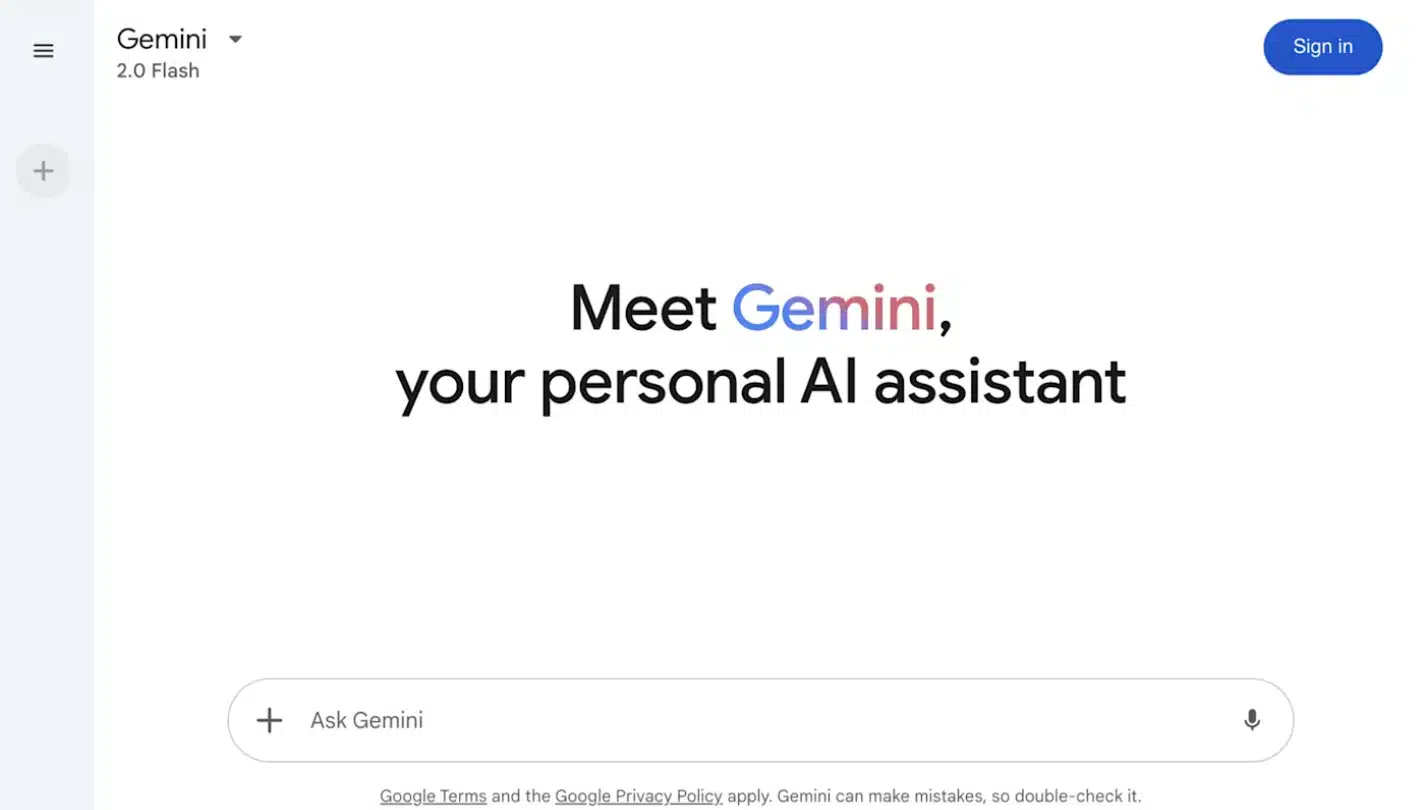
Key Capabilities
- Multimodal AI: Understands and generates text, images, code, and video
- Deep integration with Google Cloud & Workspace: Works natively across Gmail, Docs, Sheets, Drive, and more
- Enterprise-grade security & compliance: Built for large organizations with robust data governance
- Advanced data analysis: Processes large data sets in real time to surface insights and recommendations
Why It Stands Out
- Enterprise-level power: Designed to handle large-scale operations and complex use cases
- Multimodal flexibility: Goes beyond text to support visual, code-based, and multimedia applications
- Deep ecosystem integration: Natively works across Google tools already in use by many businesses
Ideal For
- Large enterprises managing vast amounts of data and content
- Teams leveraging Google Workspace or Google Cloud
- Organizations needing AI agents that scale across departments and regions
- Advanced users developing custom multimodal AI applications
4. OpenAI’s Operator – Best for Developer-First AI Agent Workflows
Operator is OpenAI’s new platform (currently in limited release) designed to give developers powerful tools for building autonomous, multi-step AI agents. Unlike basic chatbots or prompt-based tools, Operator enables agents that can plan, execute, and monitor complex workflows—often across multiple systems and APIs. With advanced memory, real-time reasoning, and robust API integration, Operator is ideal for engineering teams and SaaS companies that want to create highly specialized, production-grade AI agents.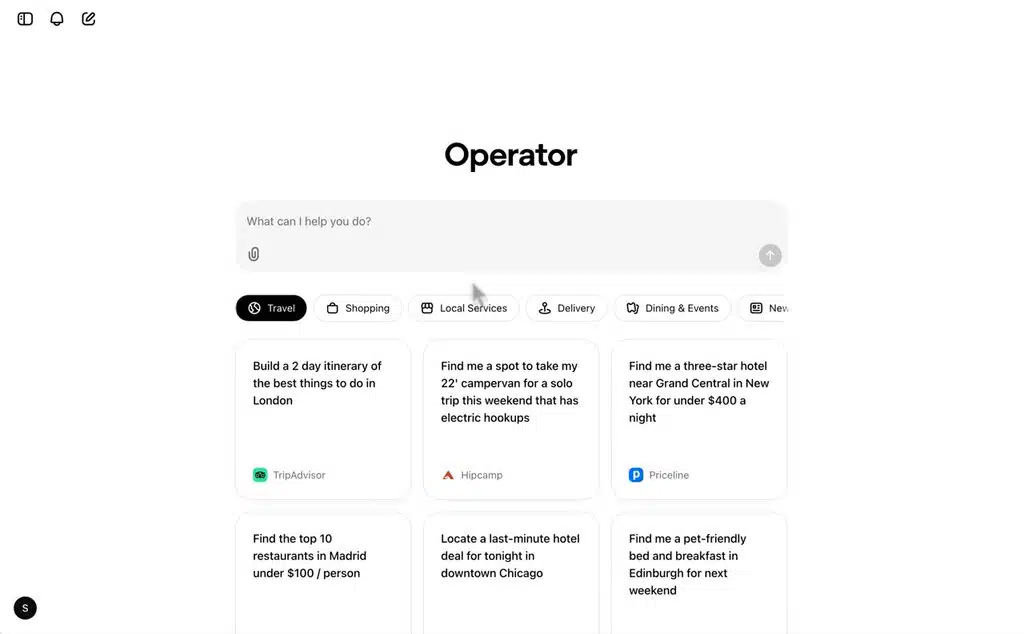
Key Capabilities
- Workflow planning & execution: Agents can handle multi-step, goal-oriented tasks
- Advanced memory: Retains context across long sessions and task histories
- Robust API orchestration: Connects and coordinates actions across third-party services
- Developer-friendly tooling: Built with APIs and frameworks for custom agent development
Why It Stands Out
- Designed for builders: Gives developers full control to craft specialized AI agents
- Extends GPT capabilities: Adds deep memory and action-oriented planning to the GPT ecosystem
- Ideal for complex or unique use cases that go beyond generic chat interactions
Ideal For
- Developer teams building custom AI products or agent-based apps
- SaaS companies adding AI-driven workflows into existing platforms
- Advanced users seeking agentic AI that operates across multiple tools and APIs
- Organizations with complex, domain-specific automation needs
5. Relay.app – Best for Cross-App AI Automation
Relay.app is an emerging AI platform purpose-built for cross-app automation. It enables users to create AI-driven workflows that span multiple tools—without writing code. With Relay, AI agents can coordinate actions across CRM, marketing platforms, project management tools, calendars, and more, making it a smart choice for streamlining business processes across the stack. Focused on accessibility, Relay.app provides an intuitive visual builder for non-technical users and powerful capabilities for more advanced teams.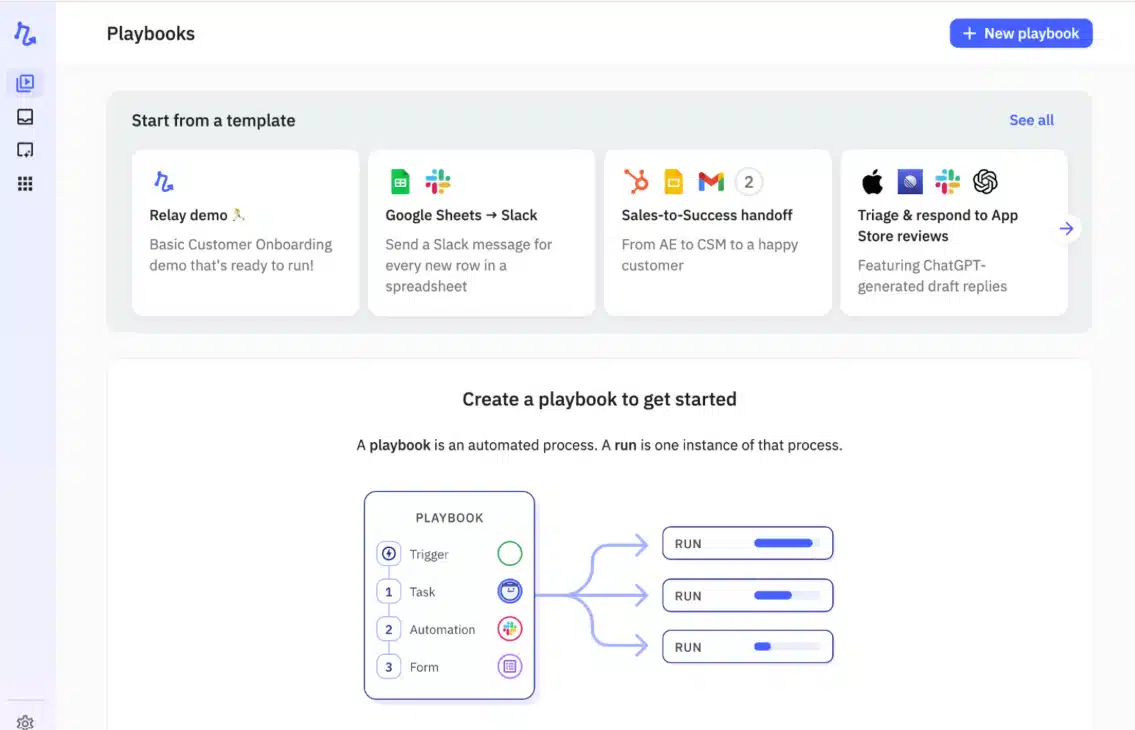
Key Capabilities
- Cross-platform workflows: Automate multi-step processes across dozens of popular apps
- AI-assisted automation: Uses AI to recommend next steps, trigger actions, and handle decision points
- No-code visual builder: Drag-and-drop interface makes it easy to create complex workflows
- Prebuilt templates: Includes ready-made workflows for common business processes
Why It Stands Out
- True cross-app automation: Coordinates AI-driven actions across an entire tool stack
- User-friendly for non-developers: No coding needed to create sophisticated workflows
- Flexible and extensible: Works for both SMBs and teams inside larger organizations
Ideal For
- SMBs and teams seeking to automate across multiple apps
- Marketing and operations teams reducing manual handoffs
- Agencies managing campaigns across client platforms
- Businesses wanting to streamline tech stacks with AI-driven automation
6. Meta AI – Best for Social Interactions
Meta AI is Meta’s advanced AI platform designed to power AI agents across Facebook, Instagram, WhatsApp, and Messenger. Focused on natural, conversational interactions, Meta AI enables businesses to engage customers where they already spend time—on social channels. With deep integration into Meta’s social ecosystem, this AI agent excels at driving conversational commerce, customer support, and brand engagement—at scale.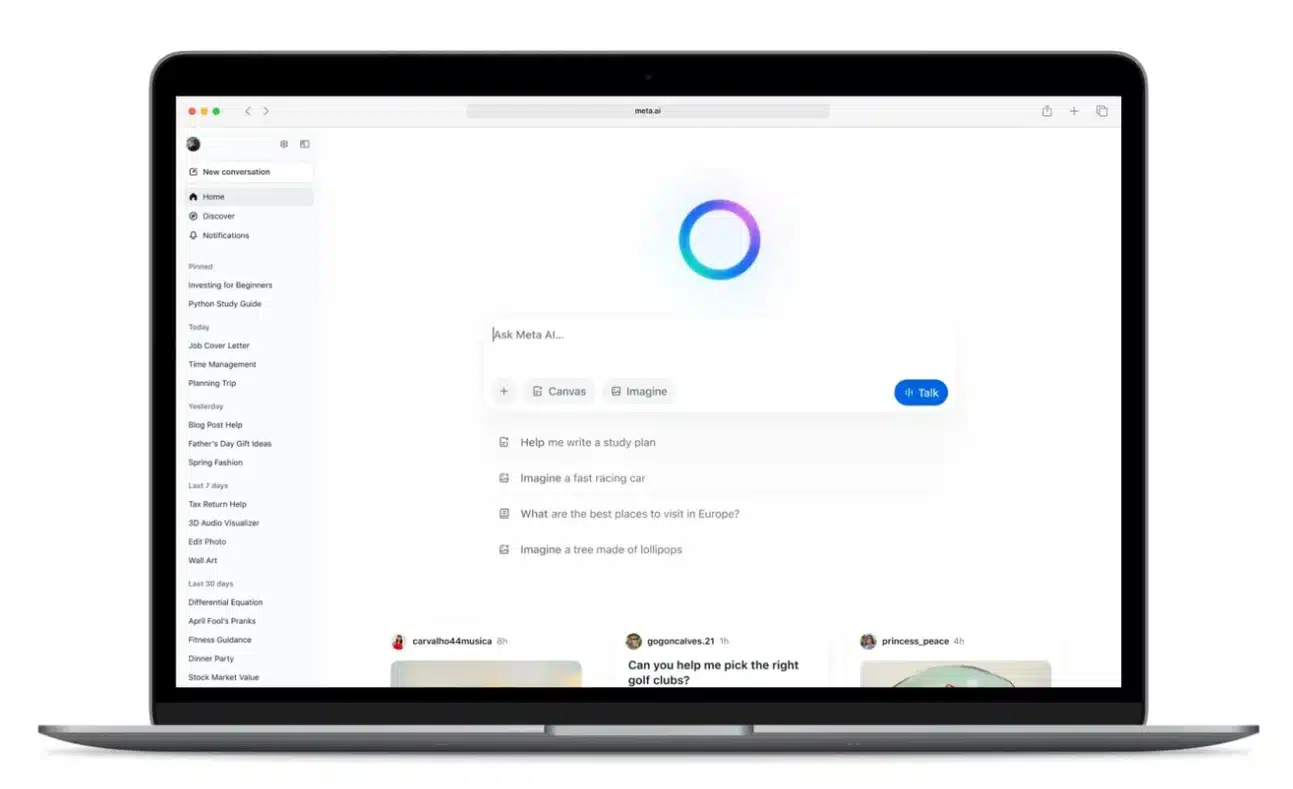
Key Capabilities
- Conversational AI across Meta platforms: Facebook, Instagram, Messenger, WhatsApp
- Commerce-driven interactions: Assists with product discovery, purchases, and customer service
- Real-time messaging: Delivers timely responses and proactive engagement
- Deep social context: Leverages insights from Meta’s platforms to personalize interactions
Why It Stands Out
- Built into the world’s largest social platforms: Connects with billions of users across Meta channels
- Highly engaging, conversational experiences: Optimized for social commerce and community building
- Drives loyalty and conversions by meeting customers where they prefer to engage
Ideal For
- Ecommerce businesses leveraging social commerce
- Brands building strong communities on Meta platforms
- SMBs offering support and engagement via Messenger or WhatsApp
- Agencies managing multi-channel social engagement for clients
7. Stack AI – Best for Building Custom AI Agents on Your Data
Stack AI is a no-code platform that empowers businesses to build custom AI agents using their own data—without needing a development team. It allows users to connect structured and unstructured data sources (like CRMs, knowledge bases, spreadsheets, and documents) and create AI agents that can answer questions, automate processes, and perform tasks based on that data. Perfect for SMBs, agencies, and internal teams looking to quickly deploy domain-specific AI agents tailored to their unique business needs.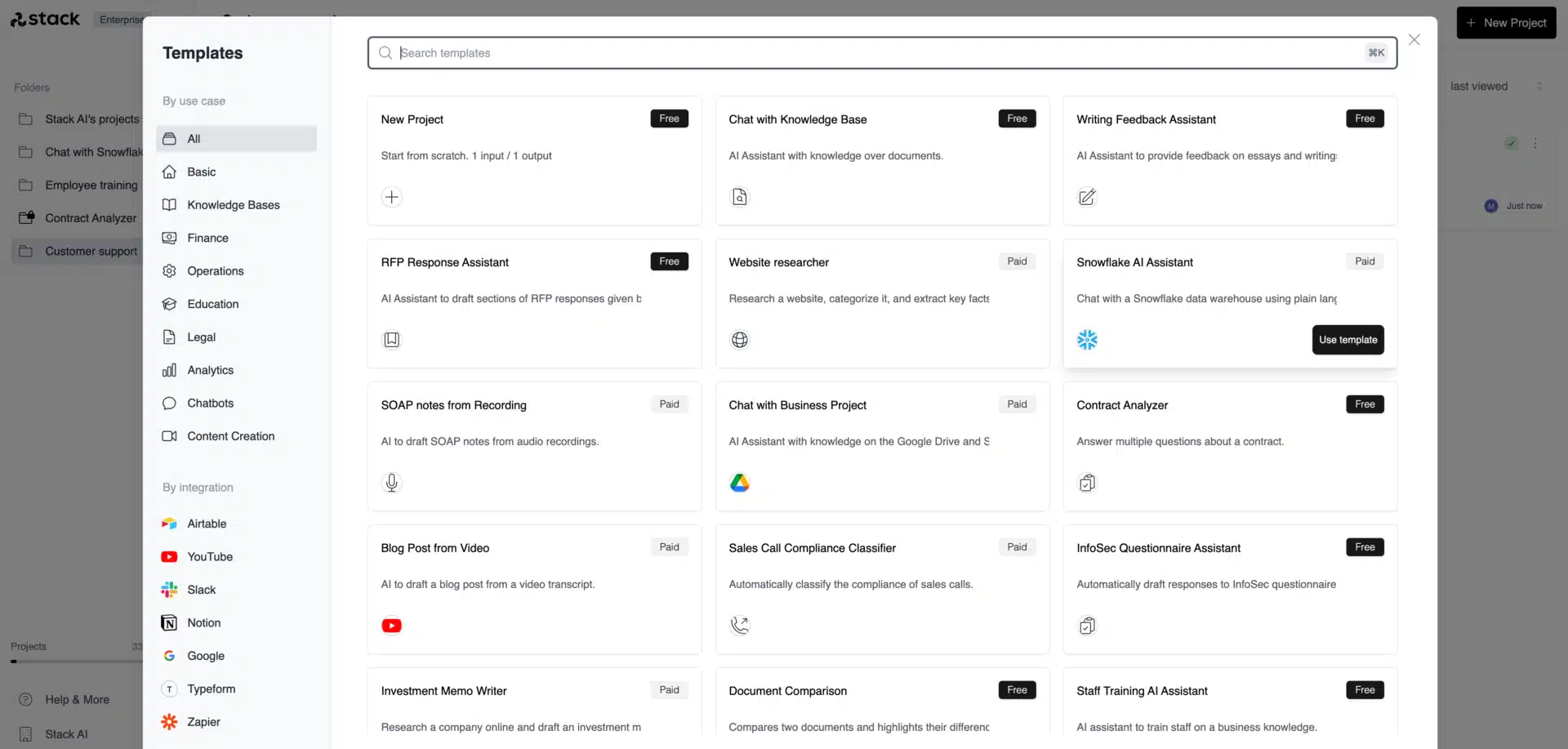
Key Capabilities
- No-code AI agent builder: Create agents without coding
- Connect your data: Easily pull in CRMs, spreadsheets, knowledge bases, and more
- Train agents on company-specific content: Agents answer based on your unique data
- Automate workflows: Build AI-driven processes around business data
Why It Stands Out
- Custom AI agents in minutes: Non-technical users can quickly deploy specialized agents
- Data privacy & control: Keep sensitive business data in-house while powering your AI
- Ideal for internal knowledge automation or client-facing AI tools
Ideal For
- SMBs wanting AI agents trained on their proprietary data
- Agencies creating custom AI tools for clients
- Internal operations, HR, and support teams
- Businesses looking to automate FAQs, data retrieval, or workflow processes
8. Devin AI – Best for Developer Operations (DevOps) and Coding Tasks
Devin AI is an emerging AI agent platform built specifically for developer operations (DevOps), coding, and software engineering tasks. Marketed as an autonomous AI software engineer, Devin can write code, fix bugs, run tests, update documentation, and interact with developer tools to streamline the entire engineering workflow. It’s ideal for technical teams looking to boost productivity, automate repetitive dev tasks, and enhance engineering velocity with intelligent AI assistance.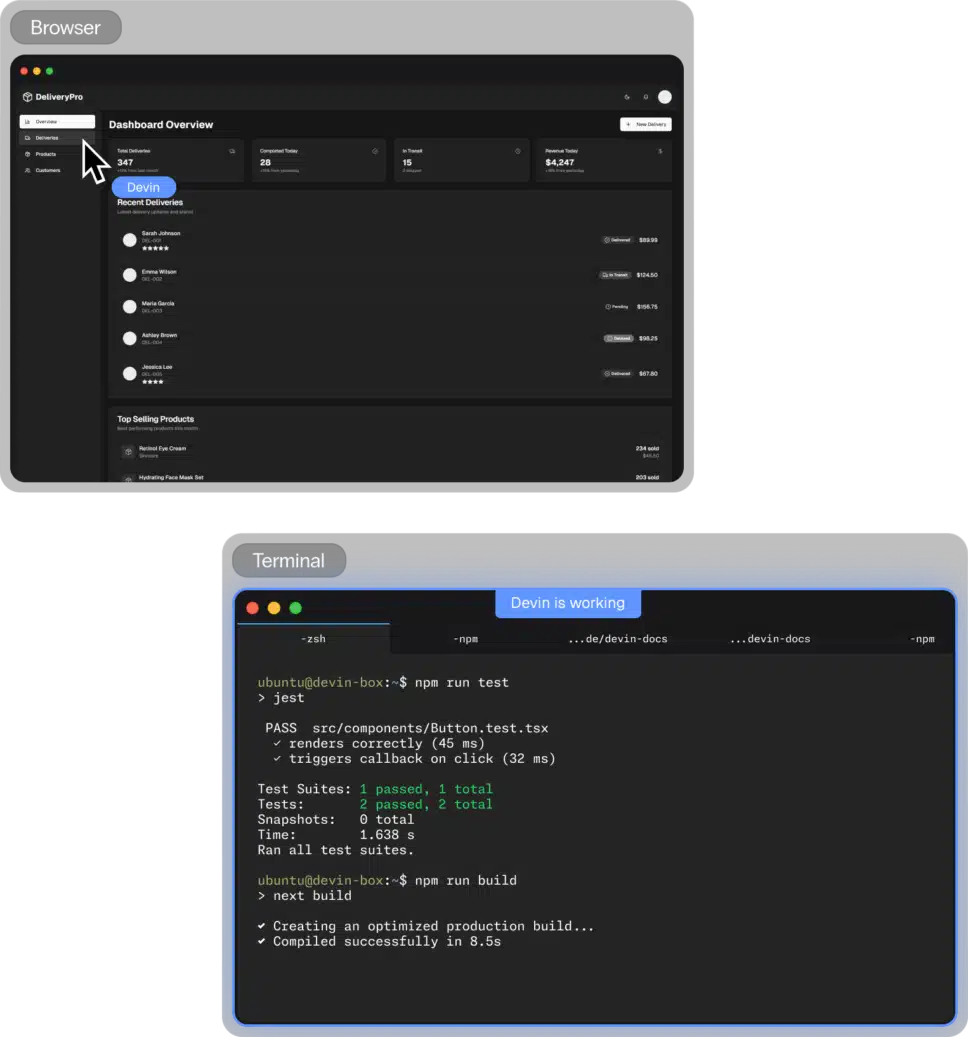
Key Capabilities
- Automated coding: Writes, edits, and refactors code
- Bug fixing & testing: Identifies and resolves bugs, writes test cases
- Toolchain integration: Connects with GitHub, CI/CD pipelines, project management tools
- Documentation & code commenting: Keeps project documentation up-to-date automatically
Why It Stands Out
- Developer-first AI agent: Purpose-built to assist software engineering teams
- Increases engineering velocity: Automates time-consuming tasks so developers can focus on core work
- Supports complex, multi-step DevOps workflows
Ideal For
- Software development teams automating coding and testing
- DevOps engineers streamlining CI/CD processes
- Startups and fast-moving tech companies enhancing development speed
- Any organization wanting an AI-powered assistant for their developer team
9. Gumloop – Best for Building Agentic Web Automation Flows
Gumloop is a modern AI agent platform focused on enabling agentic web automation—where AI agents can browse the web, interact with online tools, and complete complex workflows in the browser. Think of it as giving your AI agent the ability to “click, scroll, type, and navigate” across web apps, without needing API access. It’s ideal for automating manual, repetitive web-based tasks, making it a valuable tool for businesses that rely on SaaS tools, websites, or services that don’t offer robust APIs.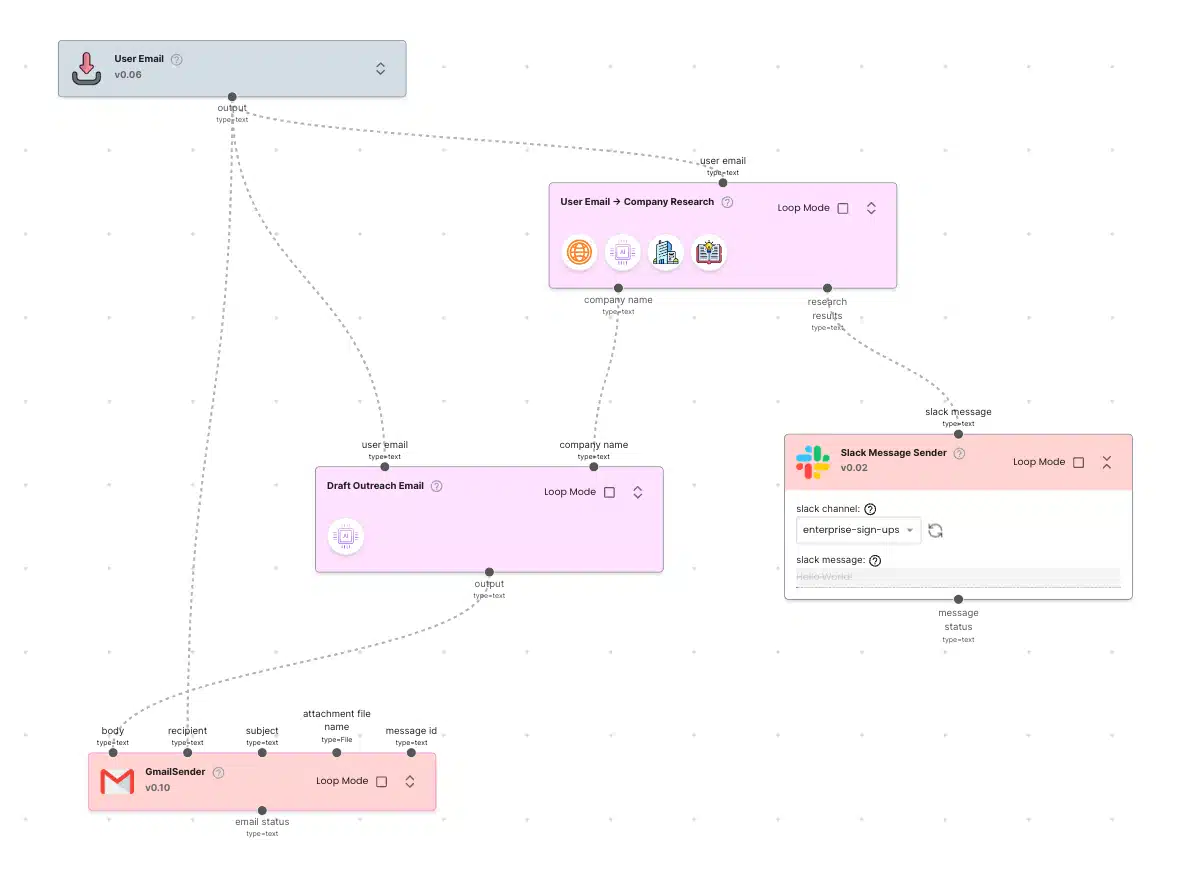
Key Capabilities
- AI-driven web navigation: Agents interact with web pages like a human would
- Automate browser workflows: Fill forms, extract data, trigger actions across sites
- No-code flow builder: Create web automation agents without writing code
- Works with tools lacking APIs: Automate across the “long tail” of online apps
Why It Stands Out
- Unlocks browser-based automation: Ideal for tools, platforms, or sites without easy API integration
- Agentic execution: AI agents handle complex, multi-step browser workflows
- Great for operations, lead generation, and internal tooling
Ideal For
- Businesses automating manual web-based workflows
- Sales and marketing teams doing lead generation or research
- Marketing agencies automating reporting or client-facing web tasks
- Ops teams reducing repetitive browser-based processes
10. Voiceflow – Best for Designing Conversational AI Agents at Scale
Voiceflow is a leading platform for designing, prototyping, and deploying conversational AI agents across channels. Originally popular for voice assistants, Voiceflow now empowers teams to create high-quality, scalable conversation flows for chatbots, virtual assistants, and AI agents—without requiring code. With collaborative design tools, version control, and multi-channel deployment options, Voiceflow is ideal for enterprises, agencies, and product teams building conversational AI experiences that work across web, mobile, voice, and messaging platforms.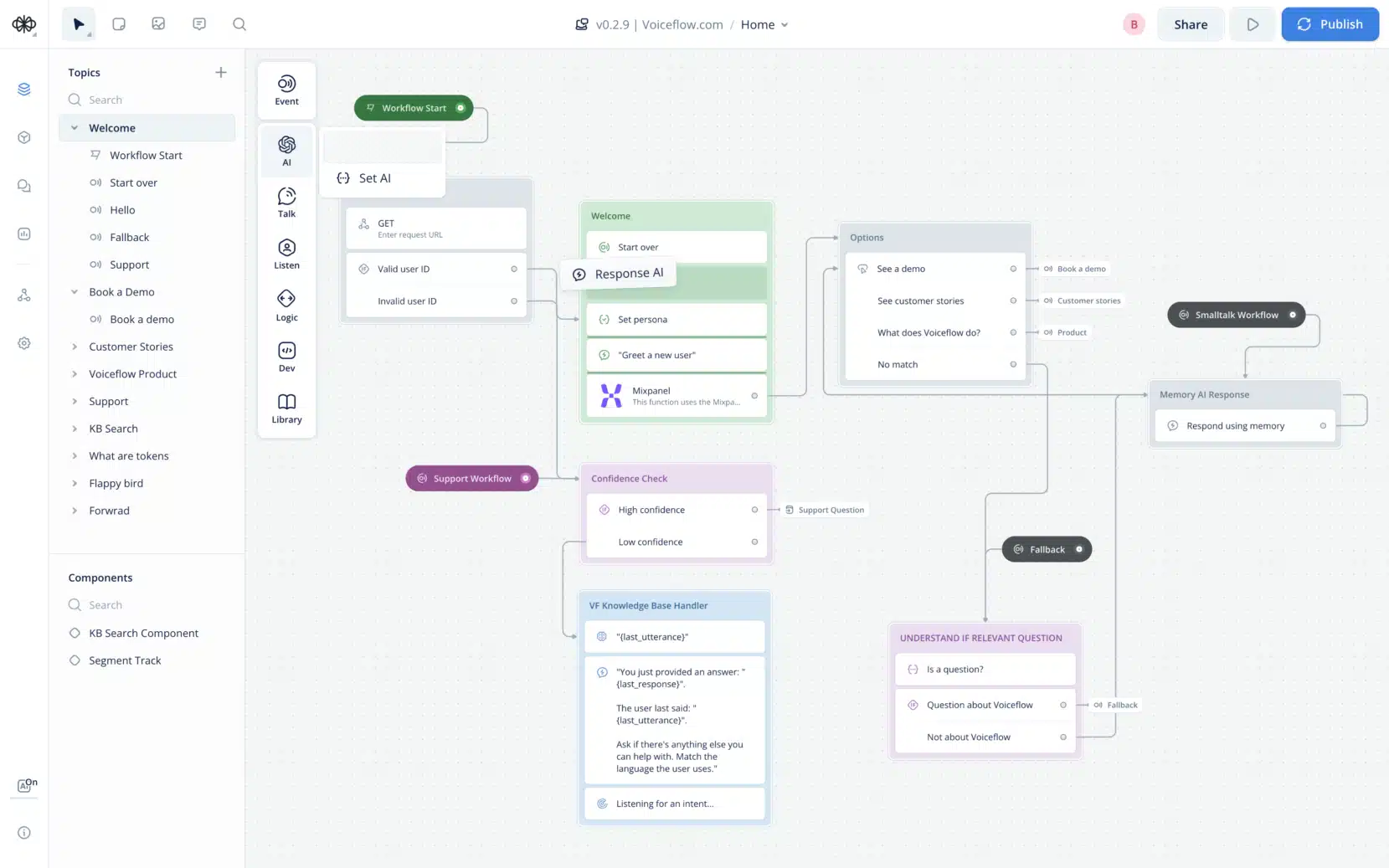
Key Capabilities
- Visual conversation builder: Drag-and-drop design for chat, voice, and multimodal agents
- Reusable components & templates: Build scalable conversational experiences faster
- Collaboration & versioning: Designed for team-based conversational AI projects
- Multi-channel deployment: Publish to websites, mobile apps, voice assistants, and messaging channels
Why It Stands Out
- Purpose-built for conversation design: Go beyond linear chatbot flows to create dynamic, natural interactions
- Scales for enterprise needs: Supports large teams, complex projects, and multi-channel delivery
- Empowers designers and non-devs to build high-quality conversational agents
Ideal For
- Enterprises building conversational AI at scale
- Agencies creating chatbots or virtual assistants for clients
- Product teams embedding conversation AI in apps or platforms
- Designers and marketers driving user engagement through conversational UX
How to Choose the Best AI Agent Platform for Your Business or Clients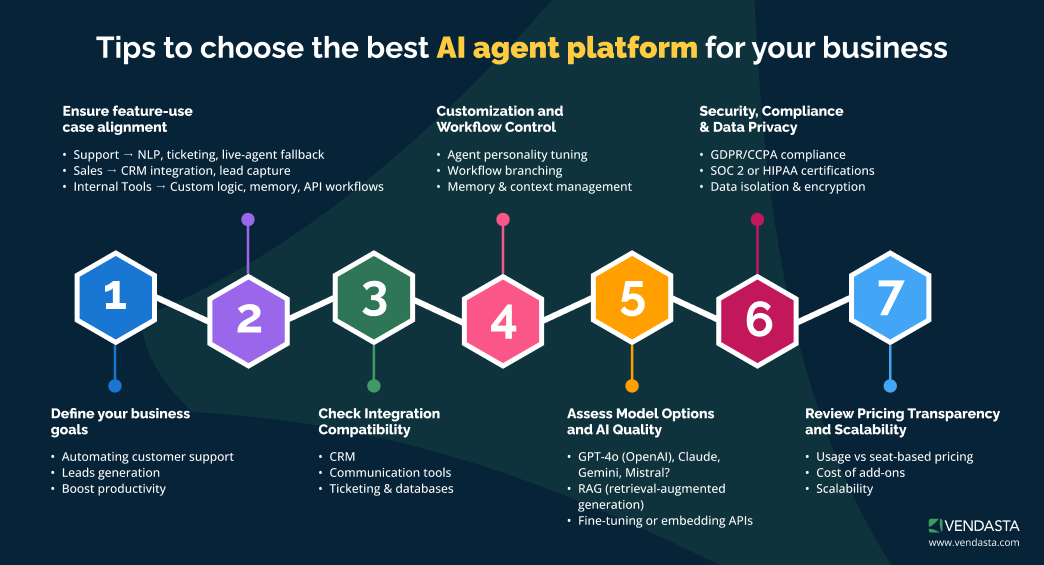
With so many AI agent platforms available, picking the right one can feel overwhelming. The key? Focus on what will deliver real impact for your business, not just what sounds cool on a feature list. Here’s a step-by-step guide to help you find the perfect fit:
Step 1: Define Your Use Case—Sales, Marketing, Support, or All Three?
Before diving into features, start with this simple question: What do you want the AI to do for you? Are you aiming to:
- Generate and nurture leads?
- Automate customer service?
- Optimize operations?
- Drive campaign performance?
Take a close look at where your current workflows feel manual, inefficient, or inconsistent—that’s often where AI can make the biggest difference. For example:
- A sales-focused AI agent might handle cold outreach and appointment booking.
- A customer service agent could manage FAQs, process returns, or escalate tickets.
- Some platforms (like Vendasta) offer AI agents that work across sales, marketing, and support—covering the entire customer journey.
Tip: The more clearly you define your needs upfront, the easier it will be to pick a platform that delivers real value.
Step 2: Check Integration Capabilities
No matter how smart an AI agent is, it can only do so much if it’s isolated from your other tools. Look for platforms that play nicely with your existing tech stack:
- CRM
- Email and marketing automation
- Scheduling and calendars
- Billing and project management tools
Seamless integration means your AI agent can pull in real-time data, trigger smarter actions, and personalize interactions based on the full customer picture. Whether it’s through native integrations, APIs, or plug-and-play connectors, make sure your AI agent can “talk to” the tools you already rely on. Without this, automation will be limited—and so will your results.
Step 3: Assess Scalability and Multi-Client Support
If you’re running an agency, MSP, or franchise, think about how well the platform can grow with your business. Consider:
- Can it handle multiple clients or locations?
- Does it offer white-label options so you can brand the AI as your own?
- Are there user permissions and account-level customization?
- Can you manage everything from shared dashboards?
Platforms like Vendasta are designed with multi-tenant support in mind—helping partners manage dozens (or hundreds) of clients efficiently, without reinventing the wheel for each one.
Step 4: Evaluate Automation Intelligence and Autonomy
Not all automation is created equal. Some platforms simply follow basic rules; others leverage AI to adapt, learn, and improve over time. Look for signs of true intelligence:
- Does the AI make proactive recommendations?
- Can it trigger actions based on behavioral data?
- Does it optimize campaigns automatically?
Imagine:
- AI that adjusts email send times based on when recipients typically open.
- AI that pauses underperforming ads or shifts budget to higher-converting campaigns—without you lifting a finger.
Smarter agents yield better results—and free up your team from constant micromanagement.
Step 5: Consider Your Team’s Technical Capacity
Finally, think about who will be managing the AI:
- Is your team looking for a no-code or low-code platform that’s quick to set up and easy to use?
- Or do you have developers ready to build custom AI agents from the ground up?
If you want fast time-to-value with minimal training, no-code platforms are a great choice—especially for SMBs or lean teams. If you’re building advanced tools, platforms like Operator or Devin AI offer deep flexibility (but also require technical expertise). Vendasta strikes a nice balance—powerful, intelligent AI automation that requires no technical team, making it accessible to partners of all sizes. Bottom line? The best AI agent platform is the one that aligns with your goals, your tech stack, and your team’s skills—and gives you the flexibility to grow.
Vendasta’s AI Employees: The AI Agent Platform Built for SMB Success
Vendasta’s AI Employees are more than just AI agents—they function as true digital team members who take action to drive measurable results. Purpose-built for agencies, franchisors, MSPs, technology providers, and the SMBs they serve, these AI agents integrate intelligence, automation, and proprietary data to enable full-funnel customer engagement.
Real AI Employees, Not Just Agents
Vendasta’s AI Employees do far more than execute tasks—they proactively work to move the business forward. They recommend the next best actions based on performance trends, customer behavior, and real-time data signals, rather than waiting for instructions. They can autonomously launch email campaigns, suggest content strategies, adjust ad targeting, follow up with leads, and manage appointments—all without constant oversight. Better yet, they continuously learn and optimize, improving outcomes over time. Unlike traditional conversational bots, Vendasta’s AI Employees are built for outcome-based execution, functioning as an extension of the marketing, sales, and support teams.
Powered by Proprietary Business Data
One of the key differentiators of Vendasta’s AI Employees is their ability to leverage first-party, SMB-specific data to drive decisions. They pull from CRM data, purchase history, past interactions, campaign performance, and behavioral insights—allowing them to personalize outreach, segmentation, and campaign targeting at scale. The result is more relevant, timely, and effective automation. This proprietary data-driven intelligence gives Vendasta’s AI Employees a significant edge over platforms that rely solely on generic language models or third-party data sources.
Built for SMB-Focused Partners
Vendasta’s platform was designed from the ground up for agencies, franchisors, and technology partners:
- White-label ready, so partners can brand both the platform and AI Employees as their own.
- Shared dashboards enable seamless collaboration and full visibility between partners and their SMB clients.
- The platform supports multi-client and multi-location management from a centralized hub.
- Robust reporting, campaign tracking, and communication tools are built specifically for service providers.
Perhaps most importantly, AI Employees can act on behalf of both the partner and the client—creating operational efficiency and opening the door for partners to offer AI-as-a-service at scale.
Automates the Full Customer Journey
Vendasta’s AI Employees support automation across the entire customer lifecycle—from first touch to long-term loyalty:
- Top-of-funnel: Identify prospects, launch lead generation campaigns, and initiate outreach sequences.
- Mid-funnel: Nurture leads, deliver personalized content, schedule appointments, and guide users through decision-making.
- Bottom-of-funnel: Trigger conversion-focused actions, such as sending quotes, requesting reviews, and initiating upsell automations.
- Post-sale: Manage follow-ups, send satisfaction surveys (such as NPS), and drive repeat business or referrals.
See how Vendasta delivers full customer journey automation below: 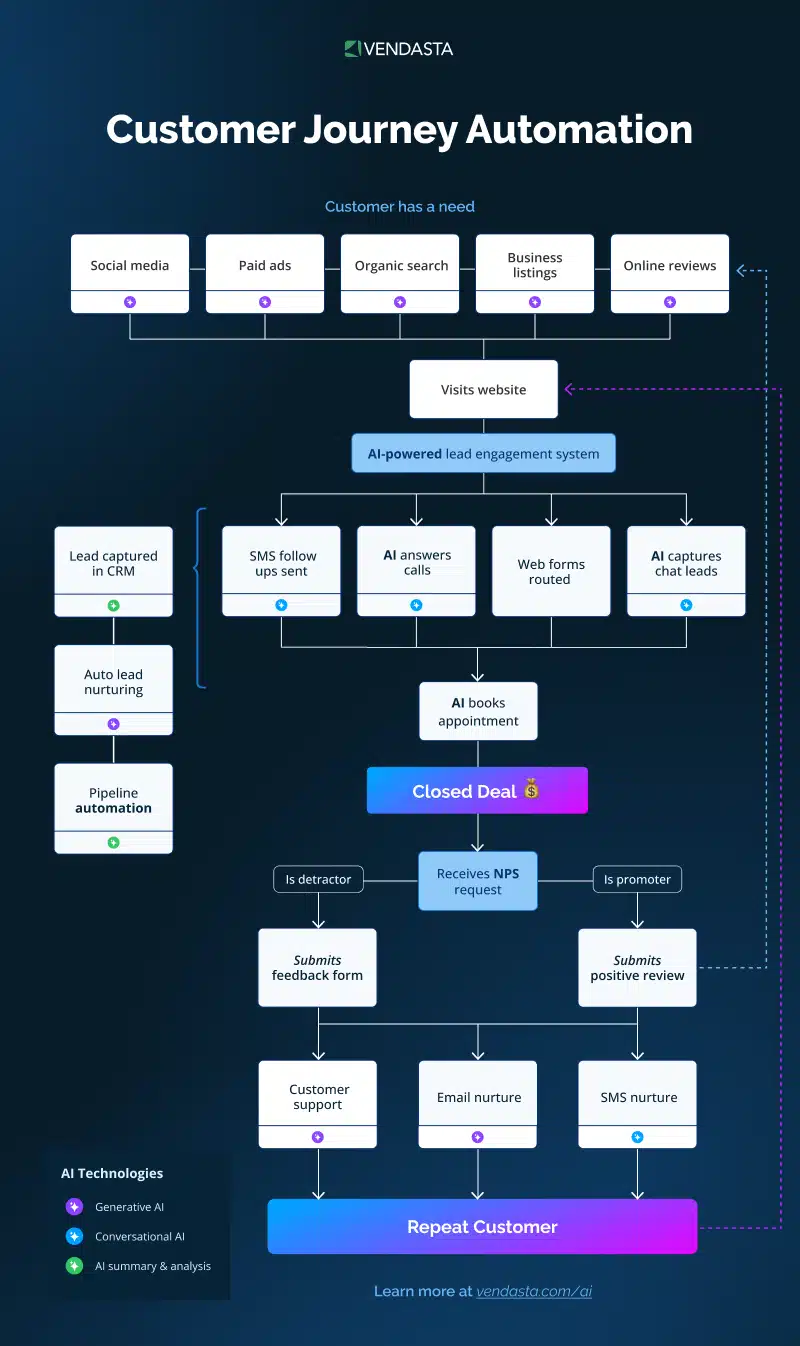 By powering automation across the full funnel, Vendasta helps partners and SMBs reduce churn, increase lifetime value (LTV), and save significant staff time.
By powering automation across the full funnel, Vendasta helps partners and SMBs reduce churn, increase lifetime value (LTV), and save significant staff time.
Integrated and Seamless
Many AI tools are siloed, focusing on a single department or use case. In contrast, Vendasta delivers an integrated, AI-powered platform that unites marketing, sales, communications, and back-office operations: AI Employees are embedded across:
- Marketing automation
- CRM
- Sales enablement
- Billing and payments
- Reputation and listings management
Data flows between all modules, ensuring coordinated actions across teams and campaigns. There’s no need for teams or clients to juggle disconnected tools—AI Employees orchestrate everything in one place. This is a major advantage over single-function AI agents, enabling a level of automation, personalization, and scalability that standalone tools simply can’t match. Bottom line: Vendasta’s AI Employees provide a comprehensive, intelligent solution that helps partners and SMBs automate more, personalize more, and scale faster—delivering results across the entire customer journey.
Future of AI Agents: What’s Coming Next?
The AI agent landscape is evolving fast—and what we’re seeing today is just the beginning. Here are four key trends that will shape the next generation of AI agents:
1. Rise of Autonomous Agents That Handle Complex Decision Trees
AI agents are moving far beyond simple task execution. The next generation will feature multi-step reasoning and more sophisticated autonomous decision-making. Imagine an AI agent that can:
- Prioritize tasks based on business impact
- Choose optimal paths to achieve goals (rather than just follow set workflows)
- Self-correct and improve based on past performance
This is like going from having a tactical assistant to having a strategic partner—one that thinks, adapts, and works alongside your team.
2. More Industry-Specific AI Agents
As AI adoption deepens, we’ll see a surge in industry-focused AI agents, pre-trained for specific verticals like:
- Pet care
- Legal
- Real estate
- Health & wellness
- Home services
These niche agents will understand sector-specific language, workflows, and KPIs right out of the box—reducing the need for customization and speeding up time-to-value. For partners, this trend will unlock exciting opportunities to deliver verticalized AI services that are truly differentiated and tailored to client needs.
3. Growth of Voice-Enabled AI Agents
As voice commerce grows and smart assistants become ubiquitous, AI agents will increasingly engage customers through voice—not just text. Voice-enabled AI agents will be embedded into:
- Websites
- Smart devices (like Alexa, Google Home)
- Contact centers
Voice will shift from being a “nice-to-have” to becoming an essential engagement channel, offering faster, more natural interactions across the customer journey.
4. Deeper Personalization Through Real-Time Learning
AI agents will continue to get smarter and more personal, thanks to real-time learning. They’ll continuously process and interpret incoming data to adapt:
- Communication style to match individual preferences
- Timing of outreach based on engagement patterns
- Offer relevance based on behavior and lifecycle stage
The result? Hyper-relevant, frictionless customer experiences that feel more human—and drive higher engagement and loyalty. In short, the future of AI agents is autonomous, specialized, voice-powered, and deeply personal, creating exciting opportunities for partners, platforms, and SMBs alike.
Powering Growth with the Best AI Agent Platform
The best AI agent platforms aren’t just fancy chatbots. They’re proactive, intelligent digital team members—working behind the scenes to drive efficiency, scale operations, and unlock real growth for SMBs and the partners who support them. Vendasta’s AI Employees deliver unmatched value by combining first-party data, advanced automation, and actionable intelligence—all within a single, unified platform. Whether you’re looking to streamline marketing, boost sales, enhance customer service, or all of the above, Vendasta helps agencies, franchisors, and technology providers deliver AI-powered results at scale. Ready to see how AI Employees can help you power growth for your business and your clients? Book a personalized demo today!
AI Agent Platform FAQs
1. What is the best AI agent platform for SMBs?
While there are many options on the market, Vendasta is widely recognized as one of the best AI agent platforms for SMBs and their partners. Why? It combines end-to-end automation and deep integration with proprietary SMB data, allowing partners to offer AI-powered services that drive measurable business outcomes across marketing, sales, support, and beyond.
2. Can AI agents replace human workers?
AI agents are designed to augment human teams, not replace them. They excel at handling repetitive, data-heavy, and time-consuming tasks—like managing follow-ups, optimizing campaigns, updating CRM records, and personalizing sales outreach. By automating this “busy work,” AI agents free human employees to focus on what they do best: strategic thinking, creativity, relationship building, and delivering exceptional customer experiences.
3. Are AI agent platforms secure?
Yes—security is a top priority for all leading AI agent platforms. Platforms like Vendasta employ robust data protection protocols, including encryption, strict user permissions, and compliance with global privacy standards (such as GDPR). Additionally, Vendasta offers granular partner-client permission controls, so partners can maintain full visibility and control over how data is used across client accounts.
4. How do I train an AI agent for my business?
With platforms like Vendasta, there’s minimal manual training required. AI Employees are powered by your existing business data—including CRM records, purchase history, customer interactions, and campaign performance. This provides them with the necessary context to make informed decisions and execute tasks effectively almost immediately. Over time, they continue to learn and optimize based on performance, requiring less day-to-day management than rule-based automation systems.
5. How do AI agent platforms improve customer engagement?
AI agents improve customer engagement by delivering personalized, timely, and relevant interactions at scale. They can engage customers in real time—whether that’s responding to inquiries, sending offers, personalizing follow-ups, or triggering lifecycle campaigns. Unlike traditional chatbots that rely on reactive scripts, AI agents like those in Vendasta can automate entire customer journeys—from initial contact to loyalty—creating consistent and compelling experiences that drive conversions and foster stronger relationships.
6. Can AI agent platforms be customized for different industries?
Absolutely. Many platforms—including Vendasta—offer industry-specific templates, workflows, and training models. This enables partners to deliver customized AI solutions for key verticals, including home services, pet care, legal, health and wellness, beauty, and more. The result: faster deployment, better relevance, and higher ROI—because the AI understands the language, workflows, and success metrics of each specific industry.
7. Are AI agent platforms suitable for small businesses with limited resources?
Yes—AI agents are often one of the most cost-effective ways for small businesses to scale. By automating key processes, AI agents can handle tasks that would normally require multiple staff members, freeing up time and resources. Vendasta’s platform is specifically designed for SMB needs, offering powerful automation that is both affordable and user-friendly, so even businesses with lean teams can take advantage of AI-driven growth.
8. Do I need technical skills to use an AI agent platform?
Not at all. While some platforms (like OpenAI’s Operator) are built for developers, many—including Vendasta—are designed for non-technical users. They offer intuitive no-code and low-code interfaces, drag-and-drop workflow builders, and prebuilt templates, making it easy for partners and SMBs to deploy and manage AI agents without the need for advanced technical skills or large IT teams.
9. How secure is my data with an AI agent platform?
Data security is a core focus for leading platforms. Vendasta, for example, ensures data protection through end-to-end encryption, role-based permissions, and compliance with industry standards and regulations. Partners also maintain control over data visibility, ensuring that only authorized users can access sensitive client information. AI Employees operate with transparency—so you always know what data they’re using and what actions they’re taking.
10. What’s the difference between an AI agent and traditional automation tools?
Traditional automation tools typically follow rigid, rule-based workflows, such as sending an email X days after a form submission. They don’t adapt in real time or learn from interactions. In contrast, AI agents are dynamic, intelligent, and adaptive. They make decisions based on real-time data (behavioral signals, campaign performance, customer preferences), learn from every interaction, and can autonomously adjust strategies to drive better results. Think of it as moving from a simple script to an AI-powered team member who’s always optimizing for success.


